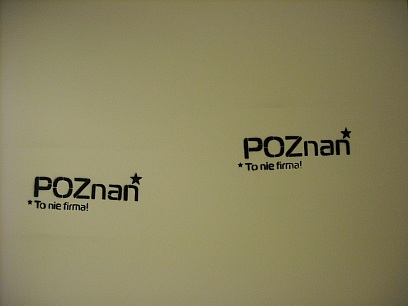| Rozbrat: Art, politics & (anti)marketing-Mediations Biennale rozbrat.org Mediations Biennale is one of the "events" inscribed by Poznań city authorities into campaign promoting city as a vibrant with culture and sport metropolis. It is getting more clear that we can observe the process of instrumentalisation of those kind of events -they're shaping brand and image of the city. This way culture becomes an element of political and economic strategy, provides it with specific character. One of the examples of this process is forcing organisers to reschedule the date of biennale's inauguration (week) to combine it with convention of culture ministers from Asia and Europe.  One of the artists invited to take part in biennale, Michelle Teran from Canada, decided to show Rozbrat as a space which is ignored by main stream of city life. Invited to assist in the project, we stated that we care much more about exposing social problems, which we're trying to face every day. Despite we've tried to avoid locking in institutional art space and wanted to go with our message outside, after various perturbations (check text and video below), we created presentation in National Museum. Through texts and photographs it shows our position on trial to locate evicted tenants in container housing estates and real situation of people who are living in them (in this case from town of Bydgoszcz). Exhibition contains also artist's contract with the organisers and mentions the fact of transferring half of her honorarium for Rozbrat-defence fund. During the opening of biennale Teran printed a stencil "Poznan: to nie firma" (Poznan: is not a company), that can be noticed in many spots in the city. Visitors could take this stencil with them to paint it in different sites to express objection against treating city as a smoothly runned company instead of social organism. Some of them, inspired by the instalation, painted stencil on the museum's wall. It's text introducing to the exhibition. Branding the terms "Biennale" and "European Capital of Culture" promotes certain legitimacy to local cultural events in an attempt to make them attractive for corporate sponsorship (and city development) tying them to economic and political agendas. Art and culture are part of larger political and economic issues that shape the daily life of any city. Invited artists are implicated to these structures. As such, these officially sanctioned spaces for art provide a rich ground for artists to address the conditions that define how their work is produced and displayed. My own work addresses the overlapping relations that create social space in both real and virtual sense. To generate a critical reflection on the complicated conditions of artistic production and social space. I am giving visibility to two creative currents that are not sanctioned by the city: Rozbrat, a sixteen year old squat and autonomous space for various political, social and cultural activities that is currently in a precarious position with the threat of closure and "Poznan: to nie firma" (Poznan: is not a company) a counter campaign to the official city campaign "Poznan: miasto know-how" (Poznan: city know-how) that became visible in the city in June, 2010. Both play a critical role in creating alternative narratives into how urban space should be constructed and used as well as the rights of its citizens to decide about the life in the city. Rozbrat is currently threatened with closure because of a plan for urban development within the Solacz district where the squat is located: the official map for the plan designates the area, and site of a vibrant cultural space as a "wasteland". Fascinated by this contradiction in a pubic debate, I approached Rozbrat with the proposal to make their issues visible within the Mediations Biennale. They agreed on the condition that we address the "social and political problems that they are working on and exist in the city". Rozbrat proposed discussion about a draft of the city to create a settlement of industrial containers intended to house the very poor people which will be constructed around the outskirts of Poznan and therefore hidden. The idea of the collective was to carry out a political action by installing a container in the city centre during the first week of the Mediations Biennale which would function as an site for information and public debate around this contentious issue. The proposal was formally rejected by the city due to pavement regulations in the city centre. A counter-proposition for use of the exhibition space within the town hall was rejected by the Biennale because it was "expressing a criticism of the city". A third suggestion to place a container in front of the hospital of Orzeszkowa Street was rejected by Rozbrat as being secluded and not an effective site for public debate. My final proposal is to make a financial contribution of 750 euros, half of my artist honorarium, to the Rozbrat collective. In this way I am supporting 16 years of social, political and cultural activity that would normally not be visible in the Mediations Biennale. My collaboration wih Rozbrat and taking up the "Poznań: To nie Firma!" campaign are in a long tradition of interventionist approaches that transform officially sanctioned art spaces into an arena where ideas can actually be transmitted to the public with the potential of translating into engagement. Michelle Teran, 02.09.2010, Berlin movie:  http://www.rozbrat.org/video?v=TMI6vWi2j9P7k&Itemid=274 http://www.rozbrat.org/video?v=TMI6vWi2j9P7k&Itemid=274 text in polish:  http://www.rozbrat.org/kultura/przestrzen/1413-sztuka-polityka-i-anty-marketing-mediations-biennale http://www.rozbrat.org/kultura/przestrzen/1413-sztuka-polityka-i-anty-marketing-mediations-biennale |
| Lees meer over: kunst, cultuur en muziek wonen/kraken |
| aanvullingen |
| rozbrat info tour |
| Social Initiative "Common Cause" - 09.10.2010 13:43 Rozbrat Collective: "Solidarity Beyond Borders" info tour:  http://indymedia.nl/nl/2010/10/70224.shtml http://indymedia.nl/nl/2010/10/70224.shtml |


No comments:
Post a Comment